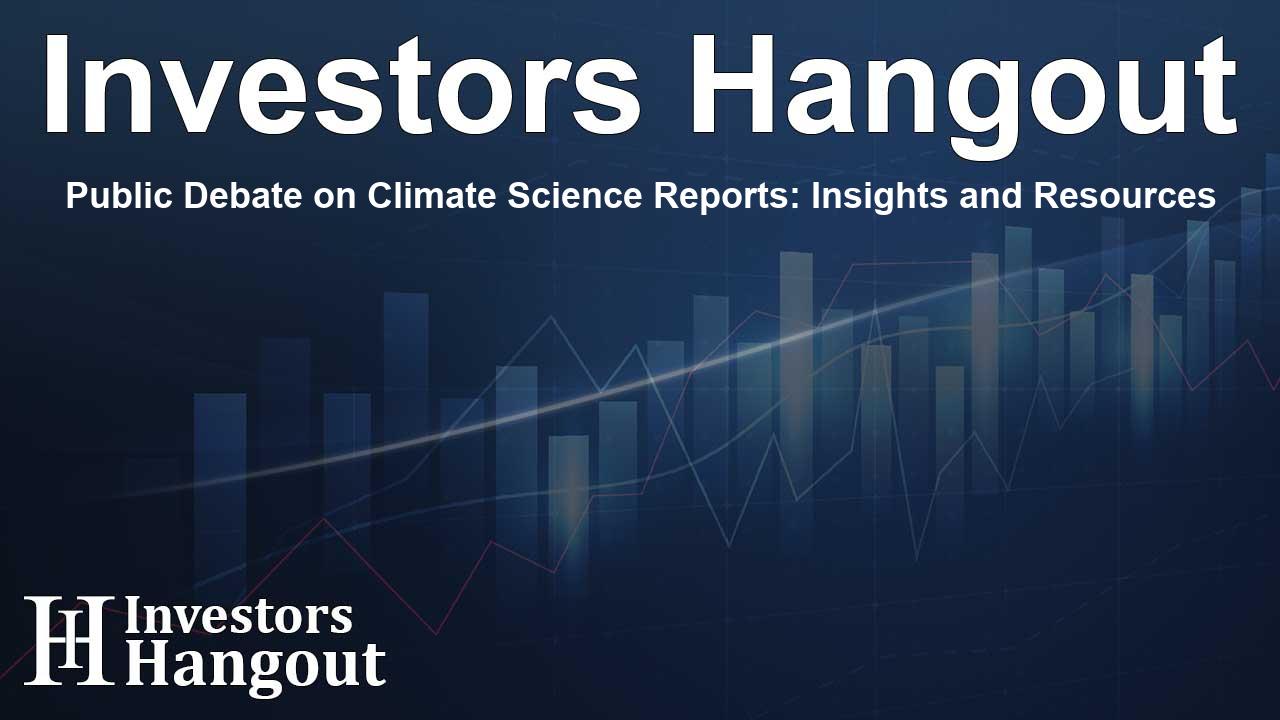Public Debate on Climate Science Reports: Insights and Resources

Understanding the Ongoing Climate Science Debate
Two recent video initiatives titled "Science - In Short" and "Who's Who in the US DOE Climate Science Report?" by Friends of Science Society aim to provide clarity surrounding the nuanced discussions on climate science. These videos serve as plain language resources designed to help the public grasp critical information presented in the controversial DOE report, which posits a non-emergency stance regarding climate change.
The Contrarian Perspective
A rebuttal by a group of 85 scientists has emerged in response to the US Department of Energy (DOE) Climate Science report. This rebuttal has been prominently featured in multiple media platforms, branding the authors of the DOE report as "contrarians" absent of significant support. Friends of Science Society emphasizes the importance of facilitating a respectful and open dialogue about such contentious issues, promoting a diversity of views through their available resources.
Introducing New Video Resources
Friends of Science Society's video, "Science - In Short," condenses chapter summaries from the DOE report, while another video, "Who's Who in the US DOE Climate Science Report?" provides insights into the authors’ affiliations and contributions. These resources are complemented by a detailed blog post that delves deeper into the overarching themes and discussions sparked by this report.
Insights from the DOE Report
A significant finding from Chapter 11 of the DOE report revolves around the Social Cost of Carbon, which influences carbon tax rates. The report suggests that climate is often overlooked as a minor factor affecting economic growth. Despite some acknowledgment of potential adverse effects from CO2 emissions, the document argues that such impacts do not warrant aggressive measures for mitigation.
Reframing the Discussion
Ken Gregory, the research director at Friends of Science Society, has voiced the need to reconsider the "social costs" associated with carbon dioxide emissions, suggesting that they could be viewed as social benefits instead. He argues that, since the DOE report indicates there is no climate emergency, it raises the question of the wisdom behind further investments in climate action initiatives.
The Role of Media in Climate Discussions
During a recent overview, Energy Secretary Chris Wright noted the tendency of media narratives to distort scientific findings related to climate change. This situation often leaves the public with an inflated or fragmented understanding of climate issues. Friends of Science Society’s materials aspire to counter such distortions by presenting a more balanced perspective.
Reactions to the Contrarian Report
The rebuttal report led by Andrew Dressler from Texas A&M University has stirred significant discussion, characterized by his assertion that the DOE report resorts to a "mockery of science." However, not all experts share this perspective. Rear Admiral Tim Gallaudet, a prominent figure in marine science and climate discussions, provided a counter-opinion, appreciating the report for its alignment with unbiased science.
Engaging the Public on Climate Issues
In a bid to encourage public engagement, Friends of Science Society invites individuals to participate in discussions around agricultural practices and climate strategies. Their upcoming event titled "Food Prices, Farming and Net Zero Ideology" promises to foster further dialogue on these pressing subjects.
About Friends of Science Society
This independent organization consists of earth, atmospheric, and solar scientists, engineers, and engaged citizens. Celebrating over two decades of operations, Friends of Science Society promotes the understanding that while carbon dioxide plays a role, the sun is the principal driver of climate change. Their commitment to scientific insights underlines their advocacy for balanced and informed discussions about climate science.
Frequently Asked Questions
What is the purpose of the videos released by Friends of Science Society?
The videos aim to provide plain language resources that make the complex discussions around climate science accessible to the public.
How does the recent DOE Climate Science report challenge mainstream beliefs?
It suggests that climate change may not be the significant economic concern that has been believed, influencing debates on climate policy.
What does Ken Gregory advocate regarding the discussion of carbon's impact?
He argues for reframing the narrative around carbon emissions from social costs to social benefits, emphasizing the lack of a climate emergency.
What role does media play in shaping perceptions of climate science?
Media coverage often distorts the scientific findings, leading to exaggerated public notions of climate change and its implications.
How can the public participate in discussions about climate issues?
Friends of Science Society encourages public engagement through discussions at events and access to their educational resources.
About The Author
Contact Olivia Taylor privately here. Or send an email with ATTN: Olivia Taylor as the subject to contact@investorshangout.com.
About Investors Hangout
Investors Hangout is a leading online stock forum for financial discussion and learning, offering a wide range of free tools and resources. It draws in traders of all levels, who exchange market knowledge, investigate trading tactics, and keep an eye on industry developments in real time. Featuring financial articles, stock message boards, quotes, charts, company profiles, and live news updates. Through cooperative learning and a wealth of informational resources, it helps users from novices creating their first portfolios to experts honing their techniques. Join Investors Hangout today: https://investorshangout.com/
The content of this article is based on factual, publicly available information and does not represent legal, financial, or investment advice. Investors Hangout does not offer financial advice, and the author is not a licensed financial advisor. Consult a qualified advisor before making any financial or investment decisions based on this article. This article should not be considered advice to purchase, sell, or hold any securities or other investments. If any of the material provided here is inaccurate, please contact us for corrections.
